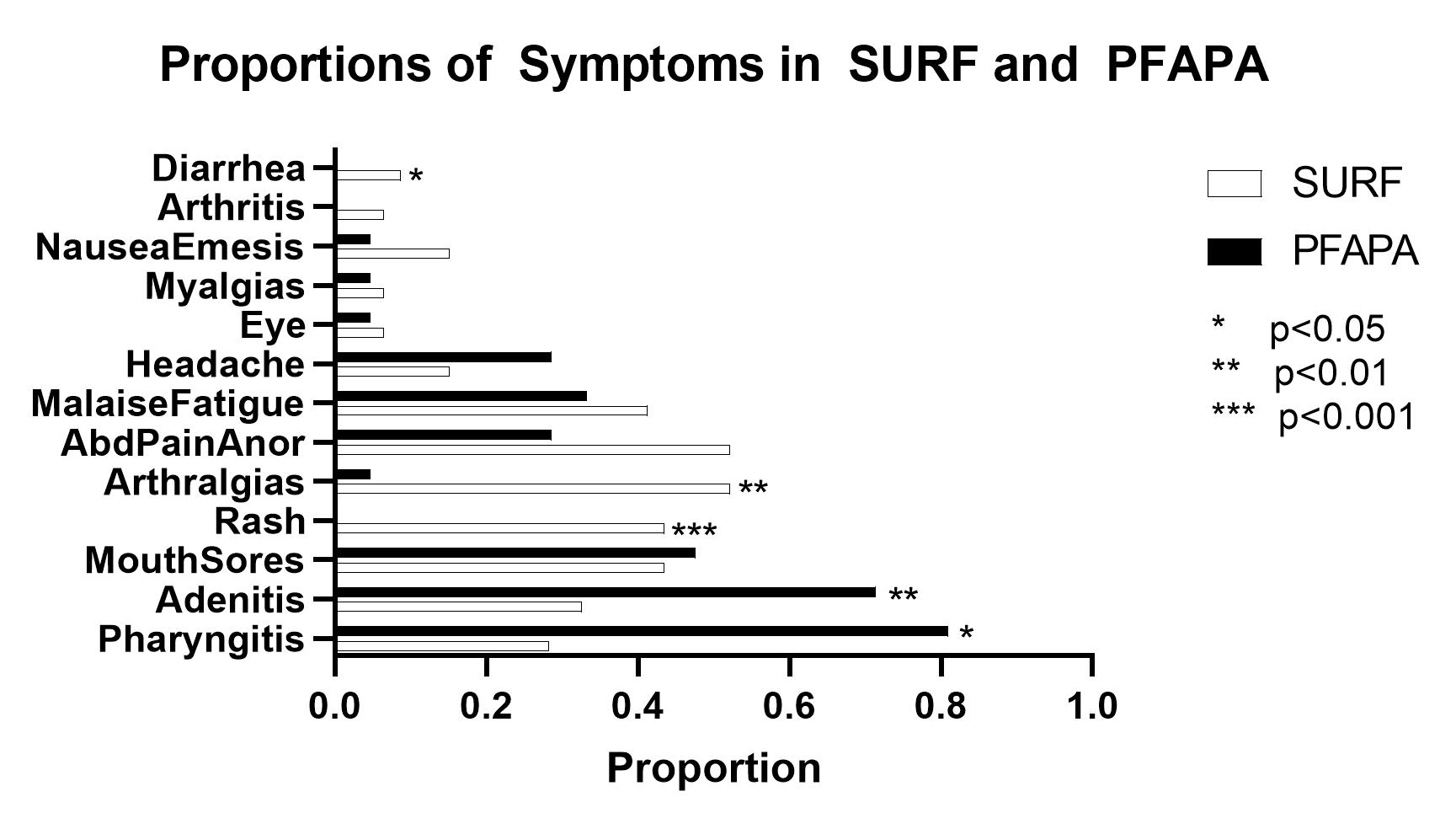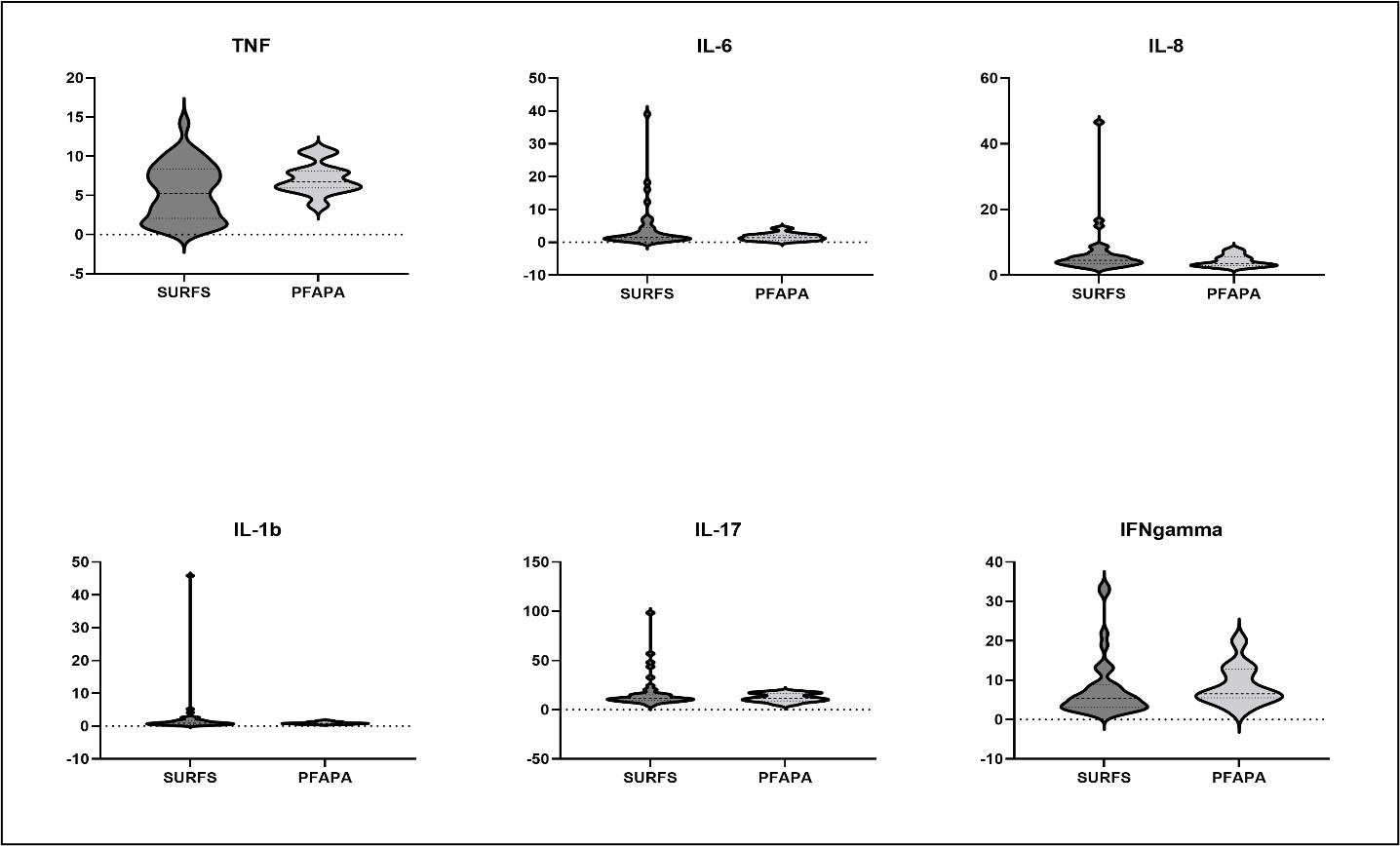Session Information
Date: Tuesday, November 14, 2023
Title: (2039–2060) Pediatric Rheumatology – Clinical Poster III: Potpourri
Session Type: Poster Session C
Session Time: 9:00AM-11:00AM
Background/Purpose: Unexplained recurrent fevers are a common presentation to pediatric rheumatology and a significant burden to affected families due to missed daycare or school days for the child and missed work days for the parent. Syndrome of Undifferentiated Recurrent Fevers (SURF) represents a group of disorders characterized by self-limited recurrent fevers and systemic autoinflammation without confirmed molecular diagnosis of a Hereditary Recurrent Fever syndrome (HRF) as well as not fulfilling criteria for Periodic Fever, Adenitis, Pharyngitis, Aphthous stomatitis syndrome (PFAPA). This study aims to differentiate the clinical and chemical findings between SURF and PFAPA; to characterize the clinical, chemical, and genetic findings; and to describe treatment responses of SURF patients.
Methods: We enrolled 47 patients followed at the Cincinnati Children’s Hospital (CCHMC) Autoinflammatory Treatment and Research Center who met criteria for SURF based on history of recurrent fevers, genetic testing negative for HRF, and did not meet EULAR/PRINTO classification criteria for PFAPA. Baseline data was collected at enrollment, including their symptoms during episodes, family history, genetic testing, and inflammatory markers/cytokines. Cytokines were run using a cytokine multiplex assay. In some patients, exome sequencing was performed with focused analysis of 394 genes implicated in known inflammatory disorders as well as primary immunodeficiency syndromes. Clinical symptoms between SURF and PFAPA were compared using Welch’s T-Test and two-tailed Fisher’s exact test. Cytokines for SURF and PFAPA were compared using Mann-Whitney U Test and hierarchical clustering.
Results: Rash and arthralgias were each more likely to occur in SURF, while pharyngitis was more in PFAPA. Symptoms in SURF and PFAPA patients are shown in Figure 1. Our analysis showed similar cytokine levels between PFAPA and SURF, however SURF patients had more outliers including IL-1beta, IL-6, IL-8, and IL-17A (Figure 2). Hierarchical clustering showed a distinct subgroup of SURF patients with elevated IFNg, IL17a, IL12p70, and IL23. Treatment response for SURF patients ranged from self-resolution to the use of biologics and are further detailed in Table 1. Genetic variants of unknown clinical significance (VUCS) were frequently found in patients with SURF. Several patients had mutations in genes that are implicated in B cell development, immunodeficiencies, granulocyte/monocyte development, and inflammatory bowel disease risk.
Conclusion: SURF is a group of patients with recurrent fevers but without a known monogenic cause. Our preliminary findings suggest SURF has distinct clinical features from PFAPA, with a subgroup that is chemically different. They also suggest SURF is heterogeneous in clinical, chemical, and genetic findings, and in treatment responses. We find frequent VUCS in pathways which may have relevance to disease pathogenesis, and possible associations to SURF endotypes. Further research is necessary to understand these SURF endotypes, what drives the disorder, and how physicians can better predict which treatment will be most successful for each patient.
To cite this abstract in AMA style:
Macaraeg M, Matt M, Handorf E, Baker E, Schulert G. Clinical, Immunologic, and Genetic Characteristics in Patients with Syndrome of Undifferentiated Recurrent Fevers (SURF) [abstract]. Arthritis Rheumatol. 2023; 75 (suppl 9). https://acrabstracts.org/abstract/clinical-immunologic-and-genetic-characteristics-in-patients-with-syndrome-of-undifferentiated-recurrent-fevers-surf/. Accessed .« Back to ACR Convergence 2023
ACR Meeting Abstracts - https://acrabstracts.org/abstract/clinical-immunologic-and-genetic-characteristics-in-patients-with-syndrome-of-undifferentiated-recurrent-fevers-surf/



